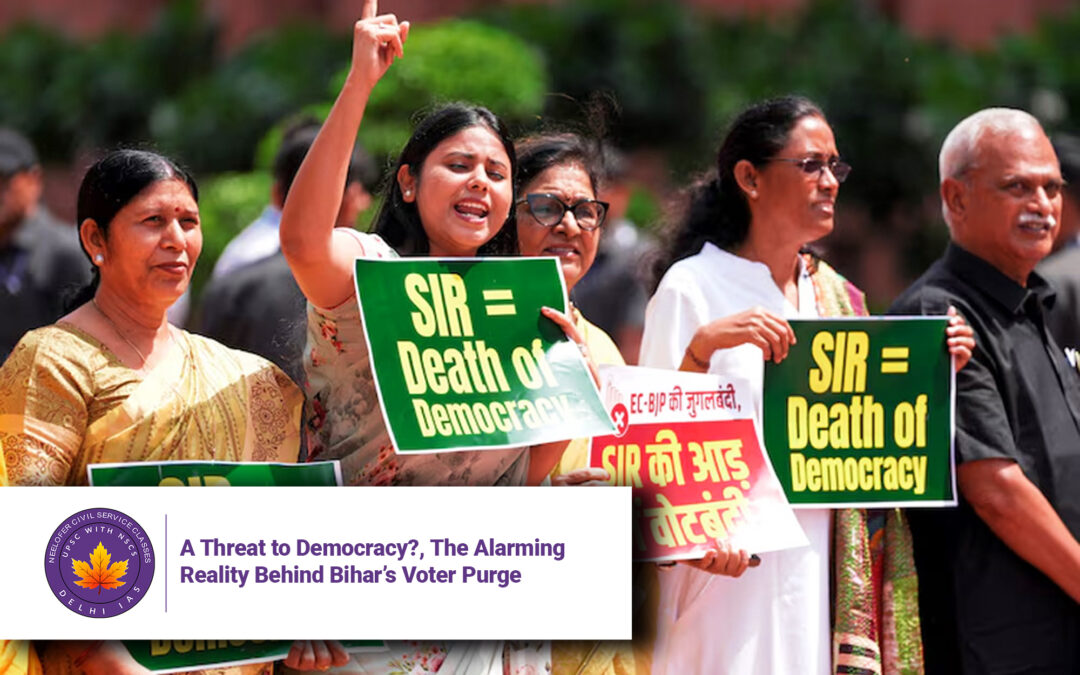A Threat to Democracy?, The Alarming Reality Behind Bihar’s Voter Purge
Why in News
As India marked its 79th Independence Day, concerns over electoral integrity came into sharp focus with the Special Intensive Revision (SIR) of electoral rolls in Bihar. The revision, launched by the Election Commission of India (ECI), required voters to furnish a narrow set of government-approved documents. This action resulted in the disenfranchisement of an estimated 65 lakh voters, many of them from marginalized communities such as migrant workers, daily-wage laborers, and the rural poor.
The issue has sparked heated debate in political, legal, and civil society circles. Critics, including prominent opposition leaders, argue that the move is not just an administrative clean-up but a coercive exclusion mechanism that threatens the very foundation of Indian democracy.
Introduction
The cornerstone of any democracy lies in the universal franchise—the right of every eligible citizen to vote. When this right comes under threat, democracy itself is undermined. In Bihar, the Election Commission’s Special Intensive Revision (SIR) has raised alarm bells. Launched on 24 June 2025, the exercise compelled citizens to submit documents such as Aadhaar, Voter ID, or ration card by 25 July 2025.
However, widely used documents like older ration cards, pre-1987 government-issued IDs, and other forms of locally recognized identification were excluded. The result was widespread disenfranchisement.
Opposition leaders, including Misa Bharti of the Rashtriya Janata Dal (RJD), have condemned the move as a bureaucratic purge cloaked in legality. They argue that the exercise disproportionately affects the poor, migrants, and marginalized groups—precisely those most vulnerable to voter suppression.
The Supreme Court of India has intervened partially, allowing Aadhaar as a valid document and mandating publication of excluded voters’ names. However, critics say this is too little, too late, as the structural problems remain unaddressed.
Key Issues and Background
1. The Nature of the SIR
The Election Commission justified the SIR as a technical correction exercise aimed at ensuring electoral rolls are clean and accurate. However, its execution has been controversial:
-
Limited acceptable documents meant that millions were left out.
-
A short one-month deadline left little time for compliance.
-
Lack of transparency in the exclusion process has raised suspicion of bias.
2. Coercive Exclusions
The EC’s decision to exclude widely accepted documents like ration cards disproportionately impacted:
-
Migrant workers who travel frequently for jobs.
-
Rural poor with limited access to updated IDs.
-
Marginalized communities like Dalits and minorities who depend on ration cards for survival.
Critics argue this is not a neutral clean-up but a structural disenfranchisement drive.
3. Legal and Constitutional Concerns
The Opposition challenged the move in the Supreme Court, citing violations of:
-
Article 14 – Equality before law.
-
Article 19(1)(a) – Freedom of expression (as voting is tied to democratic participation).
-
Article 21 – Right to life and dignity.
-
Article 325 and 326 – Right to vote and prohibition of exclusion from electoral rolls.
While the Court provided partial relief by recognizing Aadhaar and mandating publication of names, it stopped short of striking down the entire process.
4. Political Timing
The timing of the SIR—just months before the Bihar Assembly elections—has further deepened suspicions. Opposition leaders like Rahul Gandhi and CPI-M’s Dipankar Bhattacharya have termed it a “daylight robbery” and “vote theft.”
This has created a perception that the move is less about administrative accuracy and more about political manipulation.
Specific Impacts or Effects
1. Disenfranchisement of 65 Lakh Voters
The removal of approximately 6.5 million names from Bihar’s electoral rolls has direct implications for upcoming elections. Given Bihar’s history of close contests, this could decisively swing results in multiple constituencies.
2. Social and Economic Exclusion
Those most affected are:
-
Migrant laborers without fixed addresses.
-
The rural poor dependent on ration schemes.
-
Elderly citizens with outdated IDs.
This exclusion not only deprives them of voting rights but also amplifies social inequality by denying them democratic representation.
3. Democratic Undermining
By curbing access to voting, the process threatens to erode public trust in institutions. Electoral integrity is not just about clean rolls but about ensuring every eligible citizen can participate.
4. Institutional Strain
The controversy exposes the tension between the Election Commission and the Opposition. While the EC claims legality, critics highlight a lack of transparency, consultation, and inclusivity in its approach.
5. Judicial Intervention – Partial Relief
The Supreme Court’s recognition of Aadhaar as a valid ID and mandate for publishing names is a welcome corrective. Yet, many argue it is insufficient, as lakhs remain excluded without adequate remedy.
Challenges and the Way Forward
Challenges:
-
Balancing Accuracy with Inclusion – Ensuring electoral rolls are clean without excluding genuine voters.
-
Transparency – Making the process open to scrutiny and providing clear justifications for exclusions.
-
Political Neutrality – Ensuring revisions are not weaponized for electoral gains.
-
Accessibility – Allowing multiple forms of valid IDs, especially for marginalized groups.
-
Timeliness – Avoiding last-minute revisions that disrupt election preparedness.
The Way Forward:
-
Expand Accepted IDs – Include ration cards, old voter IDs, and other widely held documents.
-
Digital Integration – Link electoral rolls with Aadhaar and other databases to prevent duplication without exclusion.
-
Extended Deadlines – Provide sufficient time for compliance and corrections.
-
Public Awareness Campaigns – Ensure citizens know their rights and available remedies.
-
Judicial Safeguards – Strengthen legal oversight to protect against arbitrary disenfranchisement.
Conclusion
The Bihar voter purge controversy underscores a critical truth: democracy thrives not on legal technicalities but on inclusivity. While the Election Commission has the authority to update rolls, the manner in which it exercises this power can either strengthen or weaken democratic faith.
The disenfranchisement of lakhs under the Special Intensive Revision is more than a procedural anomaly—it is a democratic crisis. Unless corrected with transparency, inclusivity, and accountability, it risks setting a dangerous precedent for voter suppression across India.
India’s democracy has withstood many challenges, but the strength of its future lies in protecting the ballot of the poorest citizen. As the debate over Bihar’s voter purge unfolds, it is a reminder that the true test of democracy lies not in celebrating Independence Day parades but in ensuring every citizen’s voice is heard at the ballot box.
5 Questions and Answers
Q1. What is the Special Intensive Revision (SIR) of electoral rolls in Bihar?
A1. The SIR is a process initiated by the Election Commission to update electoral rolls. However, in Bihar, it required voters to submit limited government-approved IDs, leading to mass exclusions.
Q2. How many voters were affected by the voter purge in Bihar?
A2. Approximately 65 lakh (6.5 million) voters were removed from the rolls due to the stringent document requirements.
Q3. Why has the move been criticized as discriminatory?
A3. The exclusions disproportionately impacted marginalized groups such as migrant workers, rural poor, and minorities, who often lack updated IDs like Aadhaar or passports.
Q4. What role has the Supreme Court played in this issue?
A4. The Supreme Court provided partial relief by allowing Aadhaar as a valid ID and mandating publication of excluded names, but it did not fully address structural disenfranchisement concerns.
Q5. What is the larger implication of this controversy for Indian democracy?
A5. The Bihar voter purge raises concerns of systematic voter suppression, undermines public trust in electoral institutions, and highlights the need for reforms to balance accuracy with inclusivity in electoral processes.







